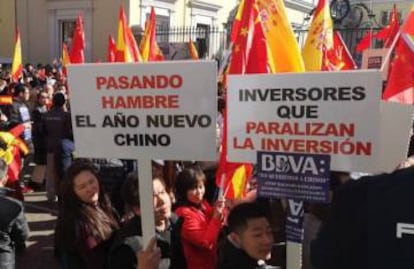Foreign students in Spain left in limbo by bureaucratic backlog
Processing delays in residency permit renewals have seen bank accounts closed, and are causing problems for those who want to travel to or from their home countries

A bureaucratic backlog is making life difficult for foreign students in Spain. Authorities are taking up to six months – twice the legal limit – to renew their residency permits, pushing the students into a state of legal limbo.
As a result, they are seeing their bank accounts closed down, are unable to pay their bills, and cannot even travel back home unless they obtain specific authorization from the National Police. Nor can they rent an apartment or hire any service that requires valid residency papers.
I find it hard to grasp why nobody foresaw that the supporting structure needed to be resized to accommodate the changes
The problem could potentially affect thousands of people. Last year Spain attracted a record 56,951 foreign students, according to the Labor Ministry. Most of these were Chinese, followed by US and Latin American students. And 37% of them are currently living in Spain thanks to a renewal of their residency papers, which must be applied for on an annual basis.
But this is precisely where the backlog is. In some cases, the delay is causing people to receive their renewed permit with only a few months left to go before it expires again, which means going through the entire process once again. In Madrid, government workers are now wading through applications filed in September.
“The state’s delay has affected many aspects of my life,” says Jessica Nieto, a native of Colombia who is doing a master’s degree in advertising in Barcelona. She lost her bank account because she lacks a valid national document, and has been unable to make cash withdrawals since January.

And during the Christmas holidays, the red tape she faced to secure a permit nearly prevented her from traveling to see her family back home. “It’s been five months since I filed my application, and all they tell me is to keep waiting,” she says.
Anne (an assumed name) is a 28-year-old American student who lives in Seville and has been in a bureaucratic limbo since October. “I’ve been here nearly three years, the renewal had never taken this long before,” she says. “I haven’t been able to leave the European Union. I’m stuck in Spain until this gets resolved. I’ve tried to go to Extranjería [Foreigners’ Office] to ask for information, but there are always hours-long lines, and I can’t stand there all morning because I have classes to go to.”
Paige, a 25-year-old student from the US who lives in the northern region of Cantabria, waited from June to October to get her residency card renewed. “During that time I was unable to have private medical insurance or go to public hospitals. I couldn’t apply for a driver’s license and my bank threatened to close my account,” she says. “All these bureaucratic problems are among the very few things I don’t like about studying in Spain.”
Same team, more work
The backlog became more evident in September, when the government issued a decree making it easier for foreign students in Spain to extend their stay for an additional year in order to seek employment or start a business.
But the measure did not involve a boost in personnel, and employees at the foreigners’ offices scattered throughout Spain suddenly found themselves processing five applications where they used to handle two.
In Madrid, the Spanish region that receives the highest number of applications, the team is made up of just nine employees. “The goal of the directive is to allow qualified foreigners who are being trained in Spain to deliver a service in this country. It also seeks to facilitate mobility within the European space. But there’s been a lack of foresight and organization,” says Vladimir Núñez, a lawyer specializing in assisting foreigners. “I find it hard to grasp why nobody foresaw that the supporting structure needed to be resized to accommodate the changes.”
Bank troubles
Eight students from several countries told EL PAÍS about their cases. The embassies and consulates of Brazil, Colombia, Mexico and Ecuador said they were unaware of the problem. The Chinese consulate admitted it had received some complaints, especially with regard to the freeze on bank accounts.
“Our great concern is not the administrative delay, but the relationship between bank and client,” said the diplomatic official Zhu Jian. “We are critical about the fact that banks are not accepting the document proving that their client is getting his or her residency permit renewed. We feel discriminated against.”
The Spanish Banking Association (AEB) says that lenders warn their clients “early enough about the need to renew their information.” But in the cases consulted by this newspaper, this margin did not extend to the six months that can elapse before the new permit is issued. Some banks accept the official document showing that the application is being processed, and others do not.
Our great concern is not the administrative delay, but the relationship between bank and client
The government delegation in Madrid has pledged to launch an action plan to deal with the backlog, but no details have been provided so far. A spokeswoman said that the personnel shortage is nothing new.
“During the last two political terms under the Popular Party (PP), staff at the Madrid delegation, which once had more than 60 workers, was reduced by 30%,” she said. The Interior Ministry, which is in charge of the Foreigners’ Offices, has not provided any explanations on the subject.
With additional reporting by Lucía Franco and María Fernanda Caballero.
English version by Susana Urra.
Tu suscripción se está usando en otro dispositivo
¿Quieres añadir otro usuario a tu suscripción?
Si continúas leyendo en este dispositivo, no se podrá leer en el otro.
FlechaTu suscripción se está usando en otro dispositivo y solo puedes acceder a EL PAÍS desde un dispositivo a la vez.
Si quieres compartir tu cuenta, cambia tu suscripción a la modalidad Premium, así podrás añadir otro usuario. Cada uno accederá con su propia cuenta de email, lo que os permitirá personalizar vuestra experiencia en EL PAÍS.
¿Tienes una suscripción de empresa? Accede aquí para contratar más cuentas.
En el caso de no saber quién está usando tu cuenta, te recomendamos cambiar tu contraseña aquí.
Si decides continuar compartiendo tu cuenta, este mensaje se mostrará en tu dispositivo y en el de la otra persona que está usando tu cuenta de forma indefinida, afectando a tu experiencia de lectura. Puedes consultar aquí los términos y condiciones de la suscripción digital.









































